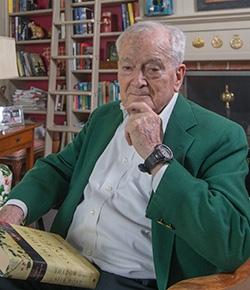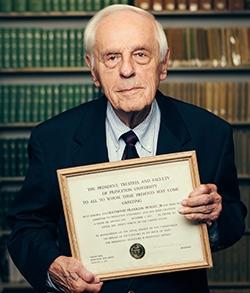Charles Allen ’45 and Raymond Beagle ’47: Princetonians In Our Nation’s Service

Three months into his freshman year at Princeton, Charles Allen ’45 was in his dorm room, enjoying a radio broadcast of a football game between the New York Giants and the Brooklyn Dodgers. Suddenly it was interrupted by a news report: The Japanese had bombed Pearl Harbor. Stunned, he realized his life was about to change.

A member of ROTC, he eventually left campus for training and combat, serving as an officer in a field artillery battalion with the Illinois National Guard stationed in the Pacific. “Everybody of military age was desperately anxious to get in the service right away,” said Allen, a retired lawyer who lives in St. Louis, Missouri.
Change of Plans
The war also disrupted Raymond Beagle ’47’s Princeton plans, delaying his scheduled arrival on campus for about three years. A talented football player from Kansas City studying at the Lawrenceville School, he was urged by Princeton representatives to apply for the Navy’s V-12 training program, which would enable him to become an officer.

The day before he left the United States to serve as commanding officer of a landing craft tank, Beagle was being issued a revolver and combat knife when someone rushed in with the news that an atomic bomb had been dropped on Hiroshima. Although that signaled the end of the war, many Japanese soldiers remained on islands in the Pacific. He was assigned to transport the troops who would defeat them.
Guiding Principles
The sense of service that guided Beagle and Allen through the war stayed with them throughout their lives.
Allen has been a loyal Princeton volunteer who served as a University trustee, president of the Princeton Club of St. Louis, class president, and a Schools Committee interviewer. Beagle, senior partner with Lathrop & Gage, a law firm in Kansas City, also is co-trustee of a foundation that disburses funds to schools, universities, and other organizations.
The sense of service that guided Beagle and Allen through the war stayed with them throughout their lives.
Grateful for their Princeton education, Allen and Beagle have made planned gifts to benefit future generations. Allen has designated the University as a beneficiary of a charitable remainder trust; Beagle has established two charitable gift annuities that will fund a scholarship.
Recalling the mood on campus when he finally arrived at Princeton after war’s end, Beagle said, “Everybody was so glad to have survived the war and be at Princeton. Out of the war came a really good country, and I was lucky to be a part of that effort.”
For more information on including Princeton in your estate plans or making another kind of planned gift, contact one of our philanthropic advisors in the Office of Gift Planning at 609.258.6318, or e-mail GiftPlanning@princeton.edu.


